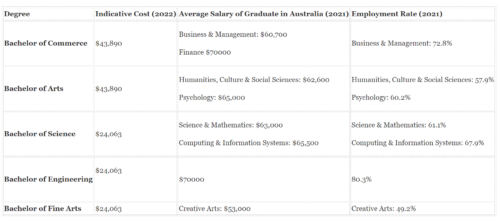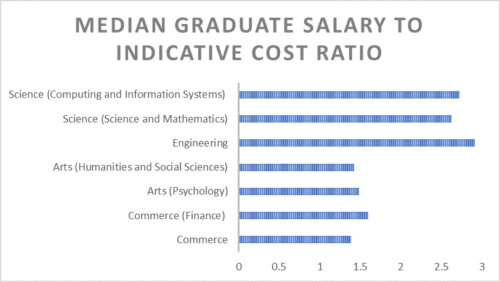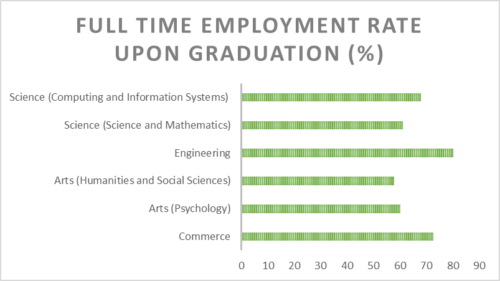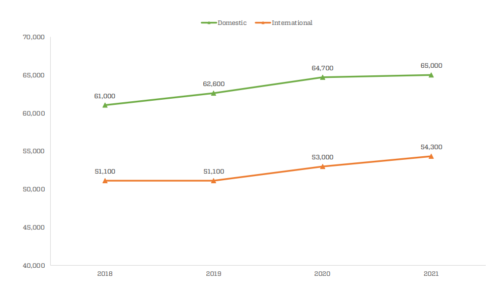

The University of Melbourne is undoubtedly regarded as one of Australia’s premier universities, consistently ranking. However, in recent years, the true value of a university education has been a contentious issue, particularly in the context of an overcrowded job market, rising cost of living and fee increases. In the context of the University of Melbourne, with nine core bachelor’s degrees that vary considerably in both graduate employment rates and salary, this article seeks to critically analyze the economic returns and job prospects of university education.
While a university education has intrinsic value beyond salary expectations, it’s imperative to consider the reality of the job market and the extent to which your studies have instilled employable skills. Although each of the University of Melbourne degrees provide its graduates with exceptional skills and knowledge to succeed in a particular field, the status quo of the labor market and the respective industries the graduates enter plays a significant role in determining their employment outcomes.
Intuitively, the courses with direct vocational applications that provide graduates with specialist skills are also the degrees which offer the highest level of return on educational investment. The highest average graduate salaries are within both Bachelor of Science and Bachelor of Engineering, with entry level remuneration ranging from $63,000 for science and mathematics to $70,000 for engineering. Similarly, medicine and engineering have the highest graduate employment rates at 80.3% and 90.2% respectively. On the contrary, the Bachelor of Fine Arts has the lowest employment rate (49.2%) coupled with an average graduate salary of $53,000.
The following table and graphs summarize the indicative costs of some of the most popular University of Melbourne degrees and the respective income of a graduate in the particular field in Australia. Please note that given the limited availability of data and the need to ensure uniformity for all subjects the nationwide median graduate income and full time employment rates has been utilized in developing the following graphics.



All of the calculations were made using data from: Student contribution amounts (unimelb.edu.au), 2021-gos-national-report.pdf (qilt.edu.au), Salary: Finance Graduate (April, 2022) | Glassdoor
As delineated by the data, the majority of the undergraduate degrees are likely to provide students with a positive employment outcome. However, it is easily discernible that different degrees provide varied outcomes for their respective graduates. The factors behind the disparities in employment outcomes and the manner in which future trends may worsen or lessen these differences is explored below.
What makes some graduates more employable?
The differences between the employment outcomes of each degree is driven by a plethora of factors stemming from the labor market. Ultimately, the wide ranging applications of the knowledge provided by each degree and the profitability and current trends in the respective industries play a key role in determining the outcomes of graduates.
With the increasing integration of technology and IT into industries world-wide and the constant innovation that is required in almost all organizations, graduates of science, technology, engineering, and mathematics (STEM) degrees have easily become some of the most sought after in any labor market. In the context of the University of Melbourne, the Bachelor of Science and Bachelor of Engineering are the go-to undergraduate degrees for students seeking to enter this lucrative field.
According to ABS Labour Force Survey data, employment in STEM occupations rose by 85% between February 2000 and February 2020, more than double the employment growth in non-STEM occupations. Additionally, between February to May 2020, sudden lockdowns and widespread layoffs led to just a 1.5% fall in employment in STEM occupations, compared to a 6.9% employment decrease in non-STEM occupations. These figures serve as an example as to why the students of the aforesaid degrees have become some of the most employable and well paid in any graduating cohort.
Additionally, the economy wide applications of a STEM degree further bolsters the value of its graduates. As noted in Australia’s 2017 National Science Statement, STEM skills ‘have value in many different jobs and industries’ as the qualification equips students with the ability to ‘find, analyze, apply and communicate complex information’. In the 2013 Deloitte Access Economics STEM Employer Survey, 71% of the respondents identified their STEM qualified staff as amongst the most innovative staff in their workplace. This positive view of STEM degrees and the value of STEM skills across society helps explain the high employment rate and high average salary that engineering graduates in particular received on average in 2021.
Moreover, degrees catering to healthcare, construction and finance industries have aided to improve graduates of related fields. For instance, the 28 years of uninterrupted economic expansion Australia encountered meant growing household income and wealth, enabling continuous growth and profits for banking and financial services. This has translated to improved income and employment for Commerce graduates and in those with a finance background; unsurprisingly finance majors remain the most well paid of all Bachelor of Commerce graduates.
Construction, too, has seen a noticeable contribution to the economy, where the industry generates over $360 billion in revenue. The construction field produces around 9% of Australia’s gross domestic product and has boosted its annual growth rate by 2.4% in the next five years. Consequently, graduates with transferable skills in engineering, architecture, project management and planning have all benefited from the growth in the sector.
Similarly, graduates with skills that relate to healthcare, education and other consumer services sectors have also experienced improvements in post-university results due to the growth in the aforesaid industries. As per the Productivity Commission’s 2021 Productivity Insights, this growth is not only fueled by Australia’s comparative advantage in services and changing consumer preferences, but also due to a number of fundamental changes in the composition of Australia’s labour market.
Australia’s aging population has increased the demand for health care and social services while higher female labor market participation rates have grown the demand for ‘home-produced services’ such as child-care. Additionally, the overall decline in easily automatable jobs has increased the demand for education services to reskill. Therefore, the long-term structural shift of the Australian economy towards services industries has triggered lasting effects on the occupation-mix and skills-mix of Australia’s labor market and in virtue of that led to changes in employment outcomes of different graduates.
The changes in the employment landscape was reflected when the Australian government planned to increase university fees for humanities subjects and decrease them for STEM courses. For example, to enroll in humanities and social science related fields, the government proposed a 113% increase, compared to the 20% reduction in science-specific courses.
Do employment outcomes differ with a postgraduate degree?
Given the Melbourne Model that is employed by the university, students aiming to enter certain professions such as Medicine and Law are required to carry out postgraduate studies. While this implies an increased commitment, these degrees provide an impressive return on the investment made by students. For instance, the employability rate of Juris Doctor graduates from the University of Melbourne is a staggering 97%, by far one of the most impressive rates for any graduate.
However, postgraduate degrees can also boost employment outcomes of students in other fields. For example, while a Bachelor of Arts degree provides a sound graduate income to cost ratio, the full time employment rates remain relatively low with a proportion of students opting to continue studies. This could indicate a need to study a postgraduate degree to deepen the knowledge in a specialty and improve employability. This is discerned in the employability rates of Masters in humanities subjects such as criminology, international or global politics with rates of around 90%.
Does the socioeconomic background of a graduate affect employability?
Graduates from higher socioeconomic backgrounds have an average full-time employment rate of around 70%, compared to those with lower socioeconomic statuses, who have an average of 67.6%. Those from a non-English speaking background also have a lower employability rate upon graduation. Although socioeconomic differences may not wholly explain variations in graduate income, their importance should not be overlooked. Despite the seemingly small significance of their contribution to these discrepancies, they may still attribute to the disparities living standards of graduates.
There is also a persistent gender pay gap that exists among graduates. For instance, in Australia, males graduates, on average, earn around 9.4% higher than female graduates. In a 2020 study, men’s undergraduate salaries were greater than women’s in fifteen of nineteen fields of education, with dentistry having the largest disparity of 11.9% between men and women. However, the progression of gender equality has positively impacted this pay gap with a reduction in the average gender disparity across all new graduates.
How does the situation differ for international students?
The University of Melbourne’s student body is 41% international students who face far higher course fees and an even more competitive employment landscape. A bachelor’s degree at the University of Melbourne can cost up to 3-4 times the domestic fees. Additionally, as noted from the graph below, the average graduate income of an international student is constantly recorded below that of a domestic graduate.

Taken from: 2021-gos-national-report.pdf (qilt.edu.au). Note that the median salary figures include only data for graduates working within Australia.
While this radically alters the value proposition of a degree, prestige, wider variety of career prospects and permanent visa potential also merit consideration. The factors which influence the decision to study at the University of Melbourne as an international student vary widely and are difficult to quantify exactly. However, the COVID-19 pandemic and subsequent treatment of international students by both government and university officials in Australia has certainly had an impact on its desirability as a hub of higher education.
Another facet of the inherent economic value of a University of Melbourne degree for international students is the ability to work in Australia to fund living and study expenses. With tough work restrictions on student visas, there have been countless reports of international students being chronically underpaid and overworked in demanding casual roles. Rampant wage theft, intense competition for graduate jobs and even higher fees weaken the economic motivation for international students.
However, on a more positive note, graduates of STEM degrees are eligible to receive a state sponsorship from the Victorian government, providing them with permanent residency and consequently better employment outcomes.
Conclusion
The University of Melbourne was founded in 1853, and in the 169 years since, the world has changed dramatically. The labor market has boomed and transformed with fundamental shifts towards technology and professional services while university degrees have become far more accessible, reducing the intrinsic employment potential a bachelor’s degree once boasted. However, the prestigious reputation of the University of Melbourne, still provides an undeniable leverage when entering the labor market. Ranked as the overall best university in Australia, the University of Melbourne sits second in terms of employability in the country and eighth across the globe while maintaining a relatively high student satisfaction rate.
In terms of employability, STEM degrees remain unrivaled, garnering higher earning potential along with relatively reasonable cost of education. This is similar to the Bachelor of Commerce degree, as it is unwaveringly ranked one of the top most popular fields of study internationally. Interestingly, while the industrial gap between arts and STEM degrees will not be reduced in the near future, students’ pursuit of Arts degrees remains, despite deterrence from the government. Notably, multiple industries catering to Bachelor of Arts students have reported growth, improving outcomes for the graduates. On the contrary, the economic value of a degree in study of creative arts is becoming increasingly difficult to justify in a purely financial lens as course fees rise and job prospects continue to decline.
Overall, the University of Melbourne derives its desirability for both domestic and international students from its prestige and security of educational investment. Although the reality of graduate job prospects can undermine the economic justification for higher education, the threshold requirement of higher educational attainment is an unavoidable aspect of many high paying roles in the Australian job market and consolidates the importance of tertiary studies.
The CAINZ Digest is published by CAINZ, a student society affiliated with the Faculty of Business at the University of Melbourne. Opinions published are not necessarily those of the publishers, printers or editors. CAINZ and the University of Melbourne do not accept any responsibility for the accuracy of information contained in the publication.